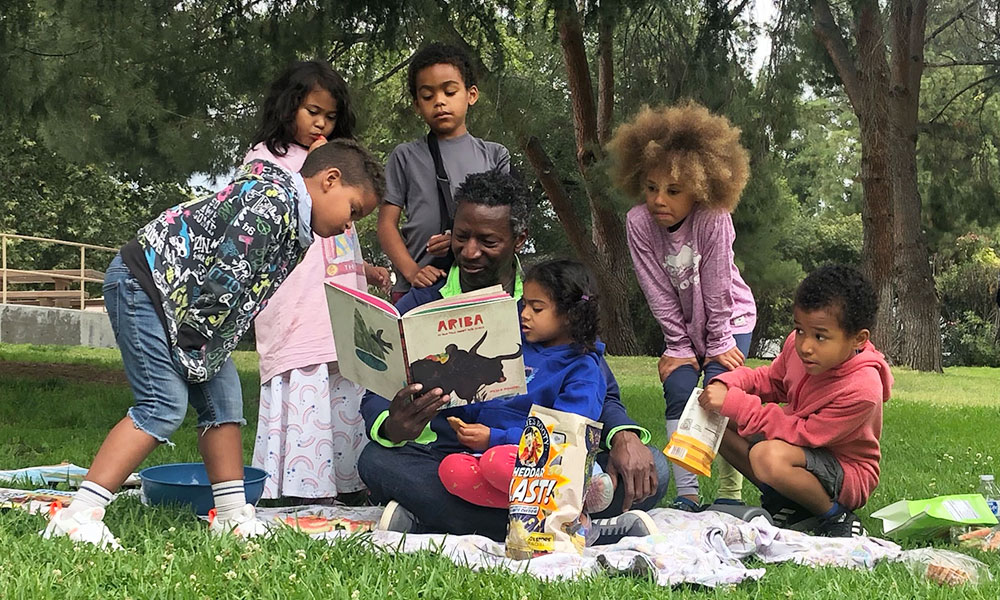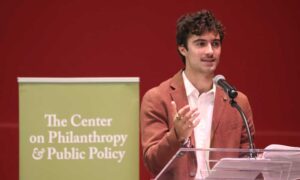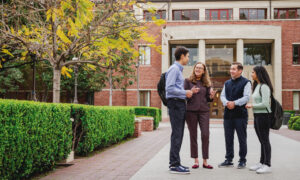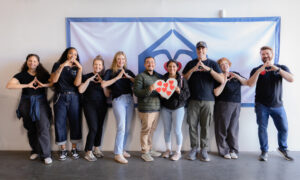Lorne Green spent his earliest years in Philadelphia, where many of his Jewish friends attended Hebrew school.
“I didn’t know what that was,” Green said. “They told me it was a place where they learned about their culture and history, and I immediately wondered if Black folks could have that too. That question has lived in the back of my mind ever since.”
Later, when he was 13 years old, Green moved with his family to Los Angeles and soon after discovered his love of acting.
“I struggled in school at times, but theater was the support I needed to find myself. The creative outlet made me feel grounded and free all at once,” Green said.
These two formative insights unite in Green’s vision for Sankofa Sukuu: The Black Heritage School, the non-profit he is ready to plan and launch after graduating with a Master in Nonprofit Leadership & Management (MNLM) degree from the USC Price of Public Policy in May 2025.
“‘Sankofa’ is a West African word that means to go back and get something you need,” Green said. “‘Sukuu’ means education. I want to create a place where Black kids can find confidence and meaning by learning about their heritage. And I want them to learn it in the most joyful way possible – with games, questions, stories, and art.”
Staying present to celebrate the past
A trained improviser, Green knows the power of saying “yes and” to the present moment – no matter what arises.
“To be a good improviser, you need to be a good listener,” Green said. “You need to connect with what is happening in a positive way, even when it’s challenging or surprising. ‘Yes and’ is the improviser’s faith in the creative potential of the people around you and the moment you share. This is the spirit I’d like to blend into education about Black history and community.”
Green improvised when the coronavirus pandemic disrupted schooling and social connection. As voices calling for racial awareness and justice grew in strength and number, Green piloted a version of the school.
“It was the perfect opportunity,” Green said. “My kids were five and three, and it was great to get them together with other kids to learn and play. We started on Zoom and then met in person. The other parents loved it. It was incredibly fun, and I was able to finally see that this idea I’ve had for such a long time could succeed.”

Green’s lessons were designed to empower children to connect to their history and identity. In some cases, this meant being thoughtful about content.
“As a Black kid in America, I thought my history began with enslavement,” Green said. “It took me a long time to realize that this wasn’t true, and so I put a lot of care into communicating that to them. I also came to realize that a lot of Black books for children feature stories of hardship and overcoming. I made sure they also had stories about Black characters having adventures, solving mysteries, making friends, and finding themselves.”
Green’s focus on empowerment also meant encouraging children to be in charge of their education.
“I let the kids lead,” Green said. “We might begin with a short story, or a history lesson, or a drawing, and then I’d let the kids ask questions or suggest the next activity or play games. Kids absorb and process things through play, and it was important to me that they learned while feeling creative, supported, and free.”
Leadership education and real-world skills
Green put his school on pause and enrolled at USC Price to build out the skillset he would need to create and scale his non-profit.
“I was looking for an education that would fill out the big picture and sharpen all the details so I could confidently lead my organization,” Green said. “The MNLM program delivered.”
For Green, highlights included rigorous training in fundraising strategies and tactics in a course taught by Adjunct Professor and Assistant Dean for Advancement Lorri Grubaugh, as well as a grant writing practicum run by Adjunct Professor and Senior Director of Development Muna Deriane that allowed students to put their passions into practice.
“Muna Deriane did an amazing job tailoring the practicum to our interests,” Green said. “She created such a thoughtful syllabus and plan for the semester, but didn’t hesitate to change it so we could contribute our skills to organizations meaningful to us.”
Finding strength in community
Green’s positive attitude toward life’s challenges faced the ultimate test while studying at USC Price. He underwent cancer treatments and lost his home to the Eaton wildfires. Despite challenges worthy of academic derailment, Green excelled in his degree, finding strength in his classmates, family, neighbors, and more. He credits his success in the program to community.
“I had a lot of support from people around me,” Green said. “And I drew on the power of my history and heritage. I knew, for example, that I had blood inside of me from ancestors who walked from Georgia to Canada to be free. That motivates me. Not only because people before me have overcome a lot and I can too, but also because I now live a different life and can accomplish completely new things.”

Master of Nonprofit Management & Leadership
A Hands-On Program for Innovative Leaders
USC’s MNLM provides the critical skills and training you need to lead complex nonprofit and mission-driven organizations.
Find Out More“This is the power of tapping into the past,” Green added. “You can connect to your roots to keep you moving forward with the inspiring knowledge that the future is always different.”
Regina Birdsell, Director of the MNLM program, said Green brings a good attitude and a strong commitment to working with clear goals and intentions.
“Those qualities were tested on every level as the Spring semester started and I watched as he kept moving forward to achieve his academic goal in spite of impossible barriers,” Birdsell said. “Those qualities will be part of his success as he moves into nonprofit leadership roles with clarity and empathy.”




